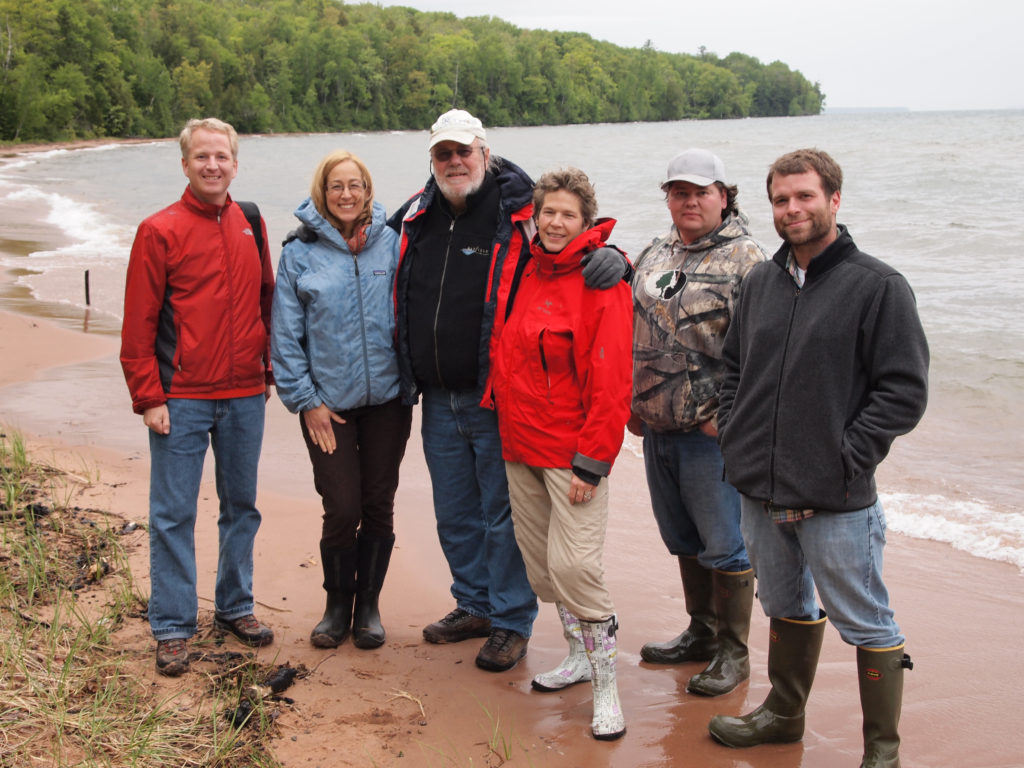In early August, we had two exciting opportunities to highlight the important work that Wisconsin land trusts are doing for Great Lakes restoration and protection in both the Lake Superior and Lake Michigan basins.
On August 6, GWC Government Relations Director, Mike Carlson, joined GWC Board members, Tia Nelson and Ellen Kwiatkowski, for a tour of the Frog Bay Tribal National Park with Congressman Sean Duffy. The Frog Bay project, which protects over a ¼ mile of Lake Superior shoreline, involved a partnership between the Bayfield Regional Conservancy and the Red Cliff Tribe and utilized federal funding through the Coastal and Estuarine Land Conservation Program (CELCP). Congressman Duffy has demonstrated leadership by assuming the role as Co-Chair of the Great Lakes Task Force with the Northeast-Midwest Institute, and this tour provided an important opportunity to show the value of programs like CELCP and the Great Lakes Restoration Initiative (GLRI), as well as the important role that land trusts can play in permanently protecting critical parcels along the Great Lakes.
It was a beautiful day on the shore of Lake Superior overlooking the Apostle Islands!

GWC board members Tia Nelson and Ellen Kwiatkowski tour Frog Bay Tribal National Park with Congressman Duffy and Chad Abel with the Red Cliff Tribe.
On August 10, we hosted the Great Lakes Restoration Tour: Milwaukee Area Successes. This tour was organized in partnership with the Healing our Waters Coalition (HOW), the River Revitalization Foundation (RRF), the Urban Ecology Center (UEC), and Ozaukee Washington Land Trust (OWLT) and emphasized significant conservation sites in southeast Wisconsin. These sites highlighted progress, as well as ongoing needs and opportunities, in Great Lakes protection and restoration. The Milwaukee sites included the Milwaukee Rotary Centennial Arboretum, which is a GLRI restoration project adjacent to the UEC and Riverside Park, and RRF’s Wheelhouse parcel, which is a restoration of a blighted site in the Milwaukee River Area of Concern into a riverfront park. Both sites sit along the Milwaukee River and are part of the 800 acre Milwaukee River Greenway. During the morning we heard from representatives from HOW, Rotary Club of Milwaukee, the Southeast Wisconsin Watersheds Trust, UEC, RRF, and the Conservation Fund.
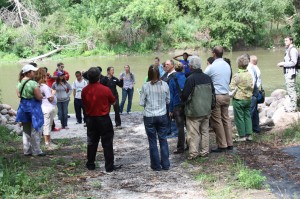
Tour participants stand on the bank of the Milwaukee River and hear about the surrounding restoration work spearheaded by the Urban Ecology Center.
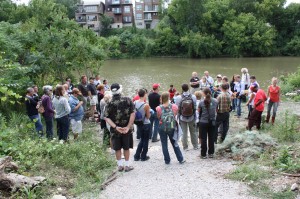
Just a mile down the River, and mile from where the River flows into Lake Michigan, tour participants visit the River Revitalization Foundation’s Wheelhouse property and hear about their restoration efforts and work to grant public access to the River.
In the afternoon, we visited the OWLT’s Forest Beach Migratory Preserve — a unique 116-acre site that was previously used as a golf course. The land trust is transforming the property into a major migratory bird stopover site and using GLRI funding to research bird and bat migratory patterns to determine the importance of stopover habitat along the Lake Michigan Migratory Flyway. During the afternoon session, we heard from representatives from OWLT, the Western Great Lakes Bird and Bat Observatory, and Ozaukee County.
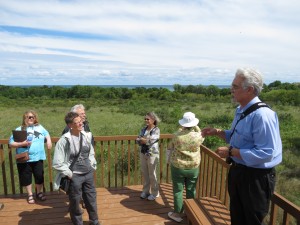
Bill Mueller of the Western Great Lakes Bird and Bat Observatory speak to tour participants at Ozaukee Washington Land Trust’s Forest Beach Migratory Preserve.
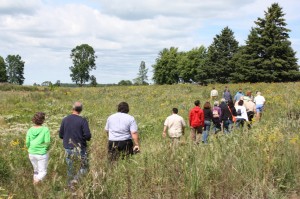
Tour participants enjoy a hike through the Forest Beach Migratory Preserve.
Tour attendees included community leaders from the Milwaukee and Ozaukee area; government officials from WI DNR and the Wisconsin Coastal Management Program; the Policy Director for the Healing Our Waters Coalition, Chad Lord; and many others. In total, more than 60 people joined us for the day. We were thrilled that Congresswoman Gwen Moore and Milwaukee County Executive Chris Abele agreed to participate in the tour and provide remarks, as they have both been long-time supporters of Great Lakes restoration. Unfortunately, at the last minute, they both needed to attend the memorial service for the victims of the tragic Oak Creek shooting. We missed them at the event, but appreciate their commitment to Great Lakes issues.
It was a great day, and we lucked out with near perfect weather!
